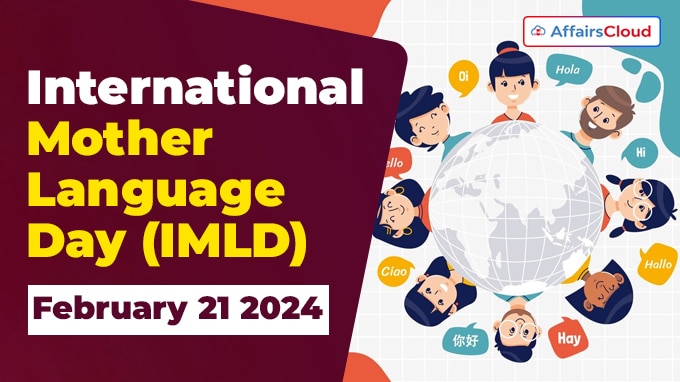 The United Nations (UN) International Mother Language Day (IMLD) is annually observed across the globe on 21 February to raise awareness about the significance of the mother language.
The United Nations (UN) International Mother Language Day (IMLD) is annually observed across the globe on 21 February to raise awareness about the significance of the mother language.
- IMLD also aims to promote linguistic and cultural diversity, and multilingualism, and underscore the role of languages in building a peaceful, tolerant, and inclusive world.
21 February 2024 mars the observance of the 25th edition of IMLD.
The 2024 theme of IMLD is, “Multilingual education is a pillar of intergenerational learning”.
- The theme emphasises the crucial role of multilingual education in achieving Sustainable Development Goals (SDG) 4.
Background:
i.IMLD has been observed throughout the world since 2000, following the proclamation of the United Nations Educational, Scientific and Cultural Organization (UNESCO).
- On 17 November 1999, UNESCO proclaimed the 21 February of every year as “International Mother Language Day”.
ii.The UN General Assembly (UNGA) welcomed the day’s proclamation in its resolution (A/RES/56/262) of 2002.
Note: The idea to celebrate IMLD originated in Bangladesh, honouring the language martyrs, who made supreme sacrifices in a language movement held in Dhaka in 1952, to uphold the dignity of their mother tongue ‘Bangla’.
International Year of Language:
i.On 16 May 2007, the UNGA adopted the resolution A/RES/61/266 and called upon Member States and the Secretariat to promote the preservation and protection of all languages used by world peoples.
ii.The resolution also proclaimed 2008 as the International Year of Languages, to promote unity in diversity and international understanding, through multilingualism and multiculturalism.
- It also named UNESCO to serve as the lead agency for the Year.
Significance of 2024 observance:
i.UNESCO’s celebration of IMLD 2024 highlighted the significance of implementing multilingual education policies and practices as a pillar to achieve SDG 4.
ii.SDG 4 calls for inclusive, quality education and lifelong learning for all and the objectives of the International Decade on Indigenous Languages (2022 – 2032).
Key Facts:
i.Currently, 40% of the global population lacks access to education in their language, hindering learning and self-esteem. It reaches over 90% in some nations.
- Leveraging native languages in education boosts learning foundations, self-esteem, and critical thinking, and facilitates intergenerational learning.
ii.Today, 250 million children and young people worldwide are not attending school; and 763 million adults struggle with basic literacy skills.
- Mother tongue education provides crucial support for learning and also facilitates the acquisition of additional languages.
2024 Events:
i.On 21 February 2024, UNESCO organised 2-panel discussions on multilingual education as a key component of quality learning and Multilingual education as a pillar of intergenerational learning to celebrate the IMLD 2024 in its headquarters in Paris, France.
ii.On 21 February 2024, the Permanent Missions of Austria, Bahrain, Bangladesh, Bolivia, Romania, and South Africa to the UN in collaboration with the UN Secretariat and UNESCO organsied an event at UN Headquarters in New York, the United States of America (USA).
About United Nations Educational, Scientific and Cultural Organisation (UNESCO):
Director-General– Audrey Azoulay
Headquarters– Paris, France
Established in– 1945




